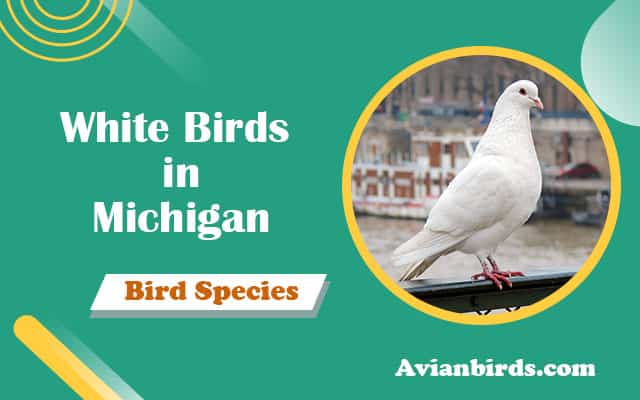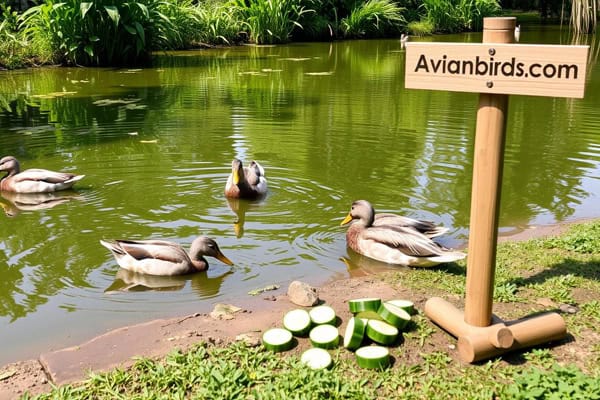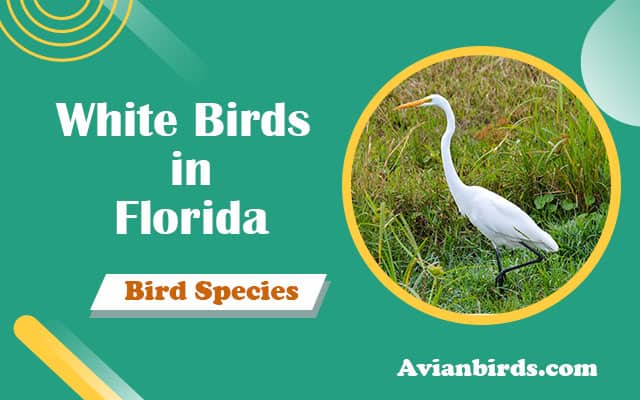6 Types of Conures (With Stunning Pictures)
Did you know Types of conures can live up to 30 years in captivity? This shows their vibrant and playful nature. It also highlights the commitment needed when choosing them as pets. We’ll look at the different types of conures, their unique personalities, and their stunning colors.
From the lively Sun Conure to the rare Queen of Bavaria, we’ll see why these birds are so loved. Whether you love birds or are thinking of getting a conure as a pet, this guide will fascinate you.
What are Conures?
Conures are part of the parrot family and are small to medium-sized birds. They have colors that range from lush greens to vibrant rainbow hues. This makes them very visually stunning. These birds are known for their playful nature and strong social needs.
They come from various parts of Central and South America. They live in different places like forests, grasslands, and even cities. This shows how adaptable conure species are. This adaptability lets us keep them as pets in our homes.
For a long time, conures have been our companions. They charm us with their fun behavior and friendly nature. Learning about the types of parrots helps us appreciate these birds more. There are many conure species, each offering something special for bird lovers.
Conures are not just beautiful and playful; they are also very smart. They need mental stimulation and like to interact. This makes them great for people who want a lively bird as a pet. By learning about conures, we get to see the joy they bring into our lives.
| Characteristics | Typical Size | Common Colors | Behavioral Traits |
|---|---|---|---|
| Social | 10-20 inches | Green, Yellow, Blue, Orange | Playful and Affectionate |
| Intelligent | Medium | Multi-colored | Vocal and Curious |
Reasons to Choose a Conure as a Pet
Conures make great pets because they are very affectionate. They form strong bonds with us, making our lives happier. This companionship brings joy and fulfillment.
Conures are also very intelligent. They can learn tricks and mimic sounds, which is fun for families. Their playful nature keeps us entertained and smiling.
These birds are great for both families and individuals. They love being part of the family and interacting with everyone. Training them or playing with them adds to the fun at home.
In summary, conures are perfect for those looking for companionship from pet birds. They are affectionate, smart, and fun. We value the time we spend with our conures, seeing them as loving family members.
Types of Conures
Exploring the world of conures reveals three main types: the Green-Cheeked Conure, Sun Conure, and Jenday Conure. Each has unique traits that make them great pets and friends. Let’s dive into their looks, personalities, and what they need to thrive.
1. Green-Cheeked Conure
- Scientific Name: Pyrrhura molinae
- Size: 24–28 cm (9.4–11 in)
- Weight: 60–100 g (2.1–3.5 oz)
- Lifespan: 15–30 years in captivity
- Diet: Seeds, fruits, vegetables, and nuts
The Green-Cheeked Conure is a small, lively bird with green, brown, and red feathers on its tail. It’s known for being loving and a bit playful, perfect for families. These birds live about 10 to 15 years and love a world full of toys to keep their minds sharp.
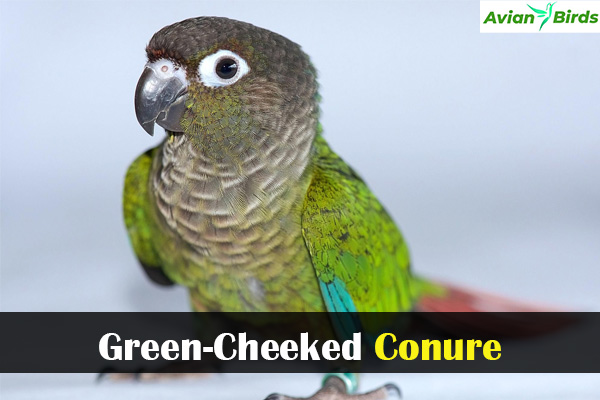
2. Sun Conure
- Scientific Name: Aratinga solstitialis
- Size: 30 cm (12 in)
- Weight: 100–120 g (3.5–4.2 oz)
- Lifespan: 20–30 years in captivity
- Diet: Seeds, fruits, vegetables, and nuts
The Sun Conure stands out with its bright yellow, orange, and green feathers. It’s as lively as its colors suggest. Though it can be loud, it’s also very loving and likes to be around people. They can live from 15 to 30 years, so they need owners who can give them lots of love and attention.

3. Jenday Conure
- Scientific Name: Aratinga jendayi
- Size: 25–30 cm (9.8–11.8 in)
- Weight: 100–120 g (3.5–4.2 oz)
- Lifespan: 15–30 years in captivity
- Diet: Seeds, fruits, vegetables, and nuts
The Jenday Conure is a joy with its bright yellow and green feathers and friendly nature. It’s adventurous and needs lots of attention from its owners. Like the Sun Conure, it can live 15 to 30 years. It’s important to make sure they have a fun and active home.
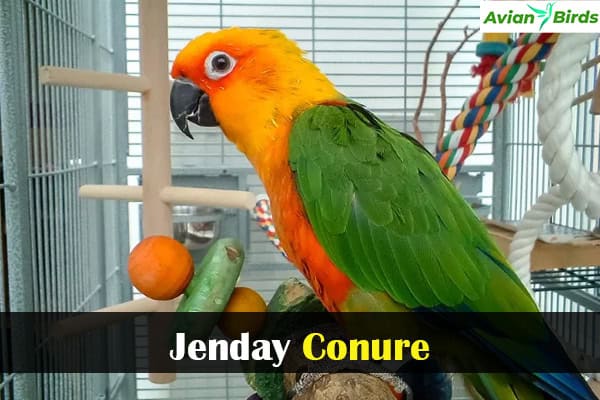
| Type of Conure | Appearance | Personality | Lifespan |
|---|---|---|---|
| Green-Cheeked Conure | Green feathers, red tail | Playful, affectionate | 10-15 years |
| Sun Conure | Bright yellow, orange, green | Affectionate, loud | 15-30 years |
| Jenday Conure | Yellow and green feathers | Friendly, adventurous | 15-30 years |
4. Mitred Conure
- Scientific Name: Psittacara mitratus
- Size: 28–30 cm (11–12 in)
- Weight: 120–170 g (4.2–6.0 oz)
- Lifespan: 20–30 years in captivity
- Diet: Seeds, fruits, nuts, and vegetables
The Mitred Conure is a charming and lively bird that makes a great addition to any family. It has striking green and red feathers that catch the eye and win hearts. Let’s dive into what makes these birds special and why they’re loved as pets.
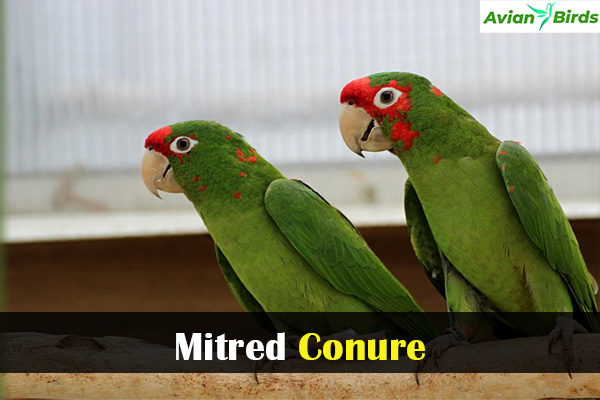
Characteristics of Mitred Conures
These types of Conures have vibrant green feathers with stunning red highlights on their heads and wings. They are full of energy and curiosity, making them wonderful companions. They love to chat and can brighten any room with their playful sounds.
These birds are also very smart. They learn quickly and enjoy being mentally stimulated. This makes training them fun and rewarding. Their playful nature means they love to interact with their owners, creating strong bonds.
Why They Make Great Pets
Having a Mitred Conure as a pet brings joy and companionship to families. Also, They have engaging personalities and need attention, making them feel like family members. They do well in active homes that offer them social interaction and mental challenges.
They can be a bit demanding, but the rewards are huge. Their playful nature encourages creativity and builds a strong bond with their owners. Adding a Mitred Conure to your life means welcoming a joyful and spirited friend.
| Characteristic | Description |
|---|---|
| Plumage | Vibrant green with red accents |
| Personality | Energetic, curious, and playful |
| Vocalization | Capable of engaging chatter |
| Trainability | Highly intelligent and quick learners |
| Social Needs | Requires regular interaction and mental stimulation |
5. Half-Moon Conure
- Scientific Name: A. canicularis
- Size: 24–26 cm (9.4–10.2 in)
- Weight: 100–120 g (3.5–4.2 oz)
- Lifespan: 15–25 years in captivity
- Diet: Seeds, fruits, vegetables, and nuts
The Half-Moon Conure is a captivating bird that brings joy and charm to our lives. They are known for their friendly nature, making them great companions during play and family time. Their vibrant personality shines through with curiosity and love.

These types of conures are also known for being one of the quieter birds in their group. Unlike some of their cousins, they don’t make much noise. Instead, they make soft sounds like playful chirps or gentle whistling, making them a delight to be around.
Getting a Half-Moon Conure means welcoming an energetic and playful friend into your home. They love to play, explore, and show affection. Their fun behaviors and curious nature make them a beloved part of any family.
6. Queen of Bavaria Conure
- Scientific Name: Aratinga guaruba
- Size: 30 cm (11.8 in)
- Weight: 120–150 g (4.2–5.3 oz)
- Lifespan: 20–30 years in captivity
- Diet: Seeds, fruits, vegetables, and nuts
The Queen of Bavaria Conure, also known as the Golden Conure, is a stunning parrot. It has golden feathers and a sweet personality. This parrot is rare and stands out with its bright colors and loving nature.
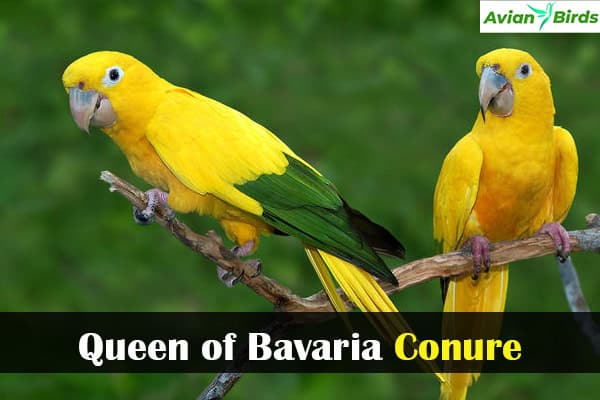
Visual Distinctions
The Types of Queen of Bavaria Conures is known for its beautiful look. Its feathers shine in a bright yellow color, with orange on the wings and tail. This makes it easy to spot among other conures. As they grow up, they get even more colorful.
Personality Traits
This conure is not just pretty; it’s also fun to be around. They love being with their owners and are always up for play. They are very social and loving, making them great pets.
Having a Queen of Bavaria Conure is a treat. They combine beauty with a lively personality. Knowing about their looks and character helps people understand why they’re so special.
| Feature | Queen of Bavaria Conure | Other Rare Conures |
|---|---|---|
| Primary Color | Brilliant yellow | Varies (e.g., green, orange) |
| Temperament | Affectionate, social | Depends on species |
| Size | Medium-sized | Range from small to medium |
| Social Needs | High; enjoys interaction | Varies; some require less |
Looking at the Queen of Bavaria Conure’s looks and personality helps us see why it’s so special. It’s a rare and loving bird that makes a great companion.
Considerations When Owning Conures
Bringing a conure into our home can be rewarding, but we must think carefully first. Owning conures means understanding their need for space, the noise they make, and their desire for social interaction.
First, we need to look at the space we have. Conures need room to move and explore. They need a big cage and safe places to fly around outside their cage. This lets them act naturally, which keeps them happy and healthy.
Next, we should think about the noise they make. Conures are loud birds, especially when they’re active. We must consider how their sounds will fit with our living situation and our family’s preferences. If we live near others, we need to make sure everyone can live peacefully.
Conures also need a lot of social interaction. They are social birds that do best with regular time with their owners. Spending time with them every day helps prevent problems. Being part of our daily life helps build a strong bond.
| Aspect | Consideration |
|---|---|
| Space | A spacious cage with room for exploration and activities. |
| Noise Level | Be prepared for loud vocalizations; consider neighbors and household members. |
| Social Interaction | Devote daily time for bonding to prevent loneliness and behavioral issues. |
| Health Concerns | Monitor for obesity, plucking, and respiratory problems; provide a balanced diet. |
| Commitment | Invest time in training and provide structure for a fulfilling life. |
Check Our Previous Articles:
| Apple Cider Vinegar In Bird Baths: |
| Scary Bird Species |
| Blue Colored Birds |
| Largest Birds of Prey |
| How to Paint a Concrete Bird Bath |
Conclusion
We’ve looked into the world of conures and found them to be delightful pet birds. From the playful Half-Moon to the beautiful Queen of Bavaria, each conure has its own special traits. These birds are not just pretty; they’re also known for being friendly and loving.
Choosing a pet bird means thinking about our lifestyle and where we live. Each conure has different needs and traits. It’s important to pick one that fits well with us. A conure can bring great joy, filling our homes with love and laughter.
Conures are more than just pets; they’re our friends who love to interact and be loved. As we think about getting a conure, let’s focus on creating a home where they can grow and be happy with us.




